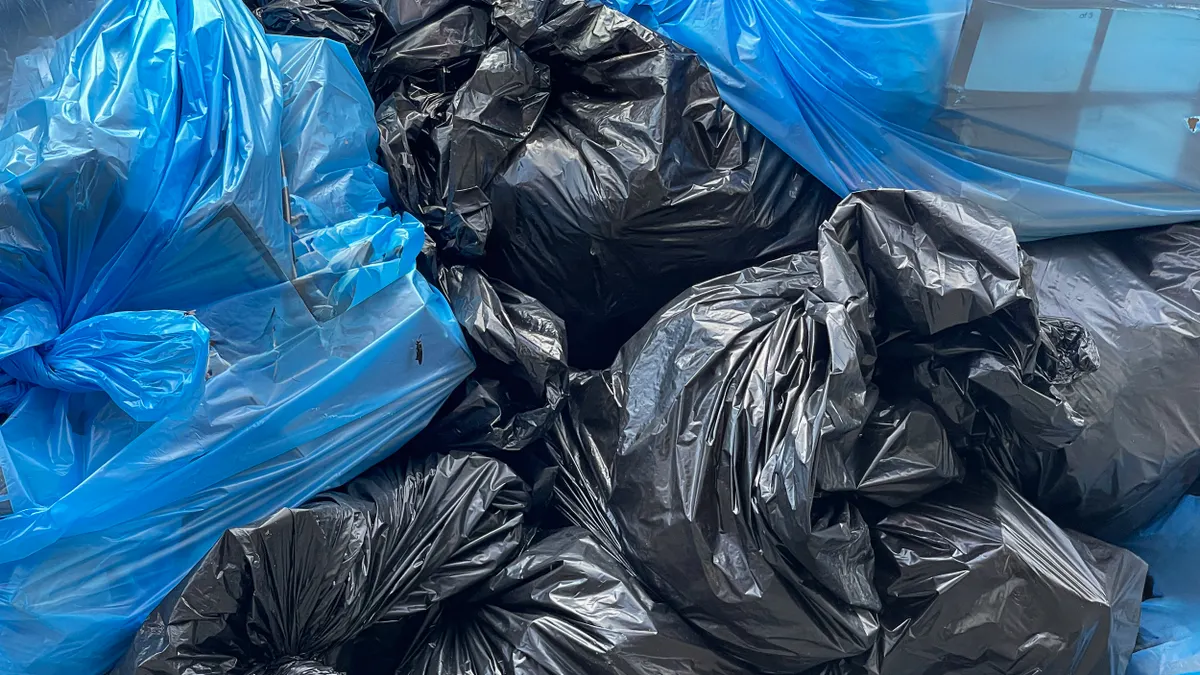Connecticut Gov. Ned Lamont plans to introduce waste and recycling legislation meant to decrease a reliance on shipping waste out of state.
During a press conference Tuesday, Lamont said he will back an extended producer responsibility for packaging bill and propose changes to the state’s organics reuse and diversion programs. He also called for restructuring the Materials Innovation and Recycling Authority to have the state manage its board as it works on decommissioning its waste-to-energy facility that closed in July 2022.
Other proposals include requiring minimum post-consumer recycled content standards for plastic beverage containers, which he said the state may model after California’s requirements.
Lamont will present more details of the proposal to the Connectict General Assembly in February as part of his 2023 legislative session priorities.
Lamont said the state needs to regain “self-sufficiency” in how it manages waste, recycling and organics systems. The state is working on its long-term management strategy in the wake of the July 2022 closure of the MIRA WTE facility, leaving questions about what to do with the loss of about 720,000 tons per year of annual disposal capacity.
About 40% of Connecticut’s waste is shipped out of state for disposal, mostly to landfills. The loss of the MIRA facility means that more than 860,000 tons of municipal solid waste will be shipped out of state each year, Lamont said in a statement. “Relying on out-of-state landfills isn’t the answer,” he said.
The Connecticut Department of Energy and Environmental Protection also released a draft update to its Comprehensive Materials Management Strategy. The right EPR for packaging bill and targeted organics diversion policies can help the state reduce its solid waste generation to about 485,000 tons per year before the end of the decade, DEEP said in the report.
DEEP Commissioner Katie Dykes said in a statement that the proposal package, “if implemented at scale, can address much of the capacity lost with MIRA’s closure” and “help municipalities control cost and avoid exposure from exporting solid waste.”
Lamont’s EPR proposal would require packaging producers to take responsibility for their products at end of life, according to the news release. DEEP estimates an EPR bill could save residents $50 million in recycling expenses by 2028 and reduce Connecticut’s “self-sufficiency deficit” by up to 190,000 tons a year.
However, Sierra Club Connecticut, along with Just Zero and Bring Your Own! Connecticut, called the proposal “flawed” and said it could actually increase packaging waste.
“Previous versions of this bill put the packaging industry in charge, failed to set mandatory packaging reduction targets, and created loopholes for toxic plastic disposal technologies, like so-called chemical recycling,” said Kevin Budris, advocacy director at Just Zero, in a statement.
The groups said the right EPR model, “if implemented correctly,” would help the state reduce waste and better recycle packaging, but only if the packaging industry is held accountable.
“The cheapest, safest, and most equitable way for Connecticut to address its waste crisis is to dramatically reduce the waste it generates in the first place,” Budris said.
Other plans include expanding existing organics programs to divert an additional 185,000 tons per year of food waste from the municipal solid waste stream by 2030. That plan entails offering residents and businesses “universal access” to source-separated food scraps collection by 2028 and allowing municipalities to contract separately for organics collection. Lamont also called for expanding the state’s current organics law to require food collection from entertainment, health care and educational sectors.
He also proposes adding a $5-per-ton fee on all MSW and C&D waste that a transfer station or volume reduction plant receives on the way to a landfill. Lamont wants to raise the $1.50 per fee on waste received at a waste-to-energy facility to $3 per ton.
Lamont called for changes to the way MIRA’s board is run in order to “facilitate proper decommissioning of the MIRA facility.” He proposes creating a new board, under state control, that would continue the resource recovery facility’s remediation plan using MIRA reserve funds to finance the process. MIRA would continue to provide services to municipalities that still use its transfer stations “until acceptable alternatives become available.”
In the meantime, DEEP said it will offer $1.5 million in state grant funding to help municipalities and regional waste authorities work on diversion programs and infrastructure development, and it will issue a request for information about the state’s infrastructure needs and solid waste management challenges.



















